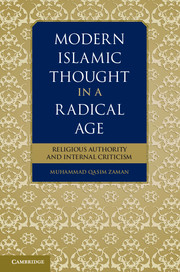Book contents
- Frontmatter
- Contents
- Acknowledgments
- A Note on Transliteration, Spelling, and Other Conventions
- Map
- 1 Introduction
- Part One
- Part Two
- 5 Bridging Traditions: Madrasas and their Internal Critics
- 6 Women, Law, and Society
- 7 Socioeconomic Justice
- 8 Denouncing Violence: The Ambiguities of a Discourse
- 9 Epilogue: The Paradoxes of Internal Criticism
- Bibliography
- Index
- References
7 - Socioeconomic Justice
Published online by Cambridge University Press: 05 November 2012
- Frontmatter
- Contents
- Acknowledgments
- A Note on Transliteration, Spelling, and Other Conventions
- Map
- 1 Introduction
- Part One
- Part Two
- 5 Bridging Traditions: Madrasas and their Internal Critics
- 6 Women, Law, and Society
- 7 Socioeconomic Justice
- 8 Denouncing Violence: The Ambiguities of a Discourse
- 9 Epilogue: The Paradoxes of Internal Criticism
- Bibliography
- Index
- References
Summary
One might well expect a good deal of concord between socioeconomic justice, the subject of this chapter, and social justice as it relates to women. However, the relationship between them is unpredictable and sometimes in quite considerable tension. By far the most striking illustration of this is provided by the Taliban of Afghanistan and their “neo-Taliban” successors in contemporary Pakistan. Even as they have instituted stringently repressive gender norms and destroyed scores of schools for girls in different parts of the Khyber Pakhtunkhwa province (or the Frontier, as I frequently refer to it in evoking its previous name), the Pakistani Taliban have sometimes positioned themselves in their particular locales as representing the interests of the poorer segments of society. Some have explicitly used the language and the imagery of social justice. As Mangal Bagh, the leader of a militant group active near the Afghanistan border, put it in 2008 in justifying his actions and highlighting the failures of the state, he and his followers had “taken [up] the responsibility for ensuring social justice…[though this] should have been the prime concern of the political authorities in the tribal territory.” At the same time, the Taliban and those allied with them have targeted the local elite that they deem oppressive, pro-government, and insufficiently committed to the shari`a. According to one 2008 estimate, more than 500 “tribal elders” – headmen, landlords, and other locally influential people – had been killed since 2004 in the tribal areas of the Frontier. Others have continued to fall prey to the Taliban elsewhere in the province.
The Robin Hood-like actions of some Taliban leaders have generated a small debate in the Pakistani press on whether issues of socioeconomic justice do, indeed, account for the Taliban's ability to entrench themselves in parts of the Frontier. One school of thought has argued that the grinding poverty afflicting large numbers of people, the lack of adequate avenues in some regions for the settlement of legal disputes, and the long-standing hold of tribal chiefs and landowners on the lives of disenfranchised peasants and laborers have all helped Taliban recruitment and that unless the government takes serious, long-term measures for the economic and social uplift of these areas, the challenge of the Taliban will not be effectively countered.
- Type
- Chapter
- Information
- Modern Islamic Thought in a Radical AgeReligious Authority and Internal Criticism, pp. 221 - 260Publisher: Cambridge University PressPrint publication year: 2012



